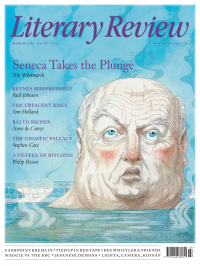Paul Johnson
Lust for Life
Universal Man: The Seven Lives of John Maynard Keynes
By Richard Davenport-Hines
William Collins 418pp £18.99
Next to Winston Churchill, John Maynard Keynes was the most remarkable and influential Englishman of the 20th century. A year before the anniversary of his death, he is now commemorated in Richard Davenport-Hines’s first-class book, which I cannot praise highly enough.
Keynes owed a lot to his parents. His father was a Cambridge don and his mother was a Newnham graduate (in the days when few women went to university), an all-rounder and public figure who, among many other things, was an outstanding mayor of that city. They both recognised that their eldest child was a winner and accompanied him when he went to sit for an Eton scholarship, rather like Ruskin’s parents. He got it and flourished there, winning an extraordinary number of prizes (ten in his first year, eighteen in his second). He got into Pop, despite being no athlete and, on his own admission, painfully ugly. He suffered from a stutter but had a remarkable voice and, from an early age, a faultless command of words, which gave him a power of persuasion that was, by all accounts, overwhelming. It is no accident that he had a lifelong devotion to Isaac Newton, acquired many of his belongings at auction and wrote a revolutionary essay about him, establishing that he was not only an expert mathematician (as was Keynes) but also a medieval-style magus, absorbed with alchemy.
Almost automatically, Keynes went from Eton to King’s College, Cambridge, an academic colony of the school, and was soon elected to the Apostles, a secret society then at its apogee. Keynes despised ordinary clubs (except the Athenaeum, which he reluctantly agreed to join), but he loved dining clubs, such as

Sign Up to our newsletter
Receive free articles, highlights from the archive, news, details of prizes, and much more.@Lit_Review
Follow Literary Review on Twitter
Twitter Feed
It wasn’t until 1825 that Pepys’s diary became available for the first time. How it was eventually decrypted and published is a story of subterfuge and duplicity.
Kate Loveman tells the tale.
Kate Loveman - Publishing Pepys
Kate Loveman: Publishing Pepys
literaryreview.co.uk
Arthur Christopher Benson was a pillar of the Edwardian establishment. He was supremely well connected. As his newly published diaries reveal, he was also riotously indiscreet.
Piers Brendon compares Benson’s journals to others from the 20th century.
Piers Brendon - Land of Dopes & Tories
Piers Brendon: Land of Dopes & Tories - The Benson Diaries: Selections from the Diary of Arthur Christopher Benson by Eamon Duffy & Ronald Hyam (edd)
literaryreview.co.uk
Of the siblings Gwen and Augustus John, it is Augustus who has commanded most attention from collectors and connoisseurs.
Was he really the finer artist, asks Tanya Harrod, or is it time Gwen emerged from her brother’s shadow?
Tanya Harrod - Cut from the Same Canvas
Tanya Harrod: Cut from the Same Canvas - Artists, Siblings, Visionaries: The Lives and Loves of Gwen and Augustus John by Judith Mackrell
literaryreview.co.uk